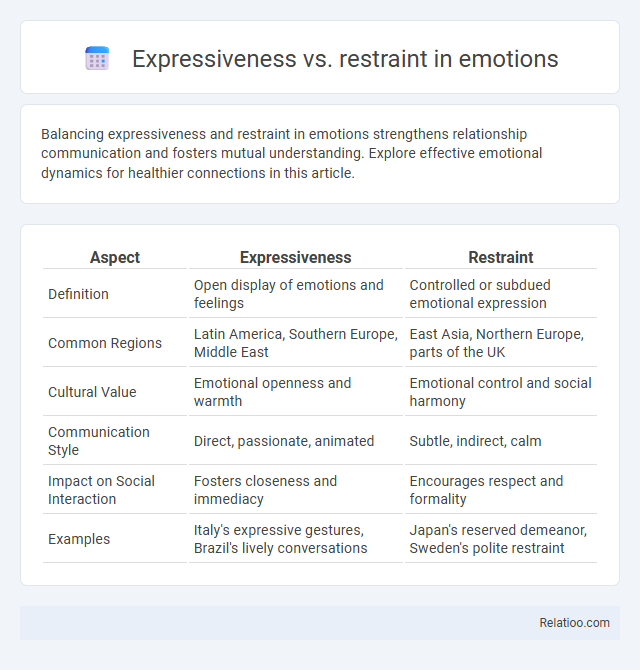Balancing expressiveness and restraint in emotions strengthens relationship communication and fosters mutual understanding. Explore effective emotional dynamics for healthier connections in this article.
Table of Comparison
| Aspect | Expressiveness | Restraint |
|---|---|---|
| Definition | Open display of emotions and feelings | Controlled or subdued emotional expression |
| Common Regions | Latin America, Southern Europe, Middle East | East Asia, Northern Europe, parts of the UK |
| Cultural Value | Emotional openness and warmth | Emotional control and social harmony |
| Communication Style | Direct, passionate, animated | Subtle, indirect, calm |
| Impact on Social Interaction | Fosters closeness and immediacy | Encourages respect and formality |
| Examples | Italy's expressive gestures, Brazil's lively conversations | Japan's reserved demeanor, Sweden's polite restraint |
Understanding Expressiveness and Restraint in Emotions
Understanding expressiveness and restraint in emotions is crucial for maintaining healthy friendship boundaries, as it helps individuals gauge when to share personal feelings or hold back to respect the other's comfort. Expressiveness can foster intimacy and trust, while emotional restraint prevents overwhelming friends and preserves mutual respect. Balancing these dynamics enables deeper connection without compromising emotional safety or boundary clarity.
Cultural Influences on Emotional Expression
Cultural influences significantly shape the balance between expressiveness and restraint in emotional expression within friendships. Collectivist cultures often emphasize emotional restraint to maintain group harmony, while individualistic cultures encourage open emotional communication to foster personal bonds. These cultural norms dictate how friends navigate boundaries, affecting trust, empathy, and the overall dynamics of emotional sharing.
Psychological Benefits of Emotional Expressiveness
Emotional expressiveness in friendships fosters psychological benefits such as reduced stress, enhanced emotional support, and improved mental health by allowing individuals to authentically share feelings without fear of judgment. Establishing appropriate friendship boundaries moderates expressiveness, ensuring mutual respect and preventing emotional overwhelm while maintaining closeness. Balancing expressiveness and restraint cultivates deeper trust and intimacy, promoting resilience and emotional well-being in social connections.
The Power of Emotional Restraint
The power of emotional restraint lies in its ability to maintain healthy friendship boundaries by preventing overwhelming displays that can strain relationships. Your capacity to regulate emotions fosters trust and respect, allowing friendships to thrive on mutual understanding rather than emotional volatility. This balance enhances connection without sacrificing personal integrity or causing discomfort between friends.
Expressiveness and Interpersonal Relationships
Expressiveness in emotions enhances interpersonal relationships by promoting authenticity, trust, and deeper understanding between friends. Open emotional communication fosters empathy and strengthens bonds, allowing individuals to navigate conflicts more effectively. However, balancing expressiveness with appropriate boundaries ensures respect for personal space and maintains relationship harmony.
Restraint in Professional and Social Contexts
Restraint in emotions within professional and social contexts ensures clear communication and maintains appropriate friendship boundaries by avoiding overstepping personal limits. It supports a balanced dynamic where trust and respect are preserved without compromising professionalism or social harmony. This measured emotional expression reduces misunderstandings and fosters a stable environment conducive to effective collaboration and genuine friendships.
Emotional Regulation: Finding the Balance
Expressiveness in emotions allows you to deepen friendships by fostering trust and understanding, while restraint helps maintain healthy boundaries to avoid emotional overwhelm. Effective emotional regulation involves recognizing when to share your feelings openly and when to hold back, ensuring that your connections remain supportive without becoming burdensome. Striking this balance strengthens your relationships and promotes mutual respect.
Risks of Excessive Expressiveness
Excessive expressiveness in emotions can strain friendship boundaries by overwhelming Your friends with intense feelings, leading to discomfort or misinterpretation. Over-sharing may blur personal limits, causing emotional fatigue or dependency that disrupts balanced interactions. Maintaining restraint helps preserve trust and mutual respect, ensuring friendships remain supportive without becoming emotionally burdensome.
Consequences of Over-Restraint in Emotions
Excessive restraint in expressing emotions within friendships often leads to misunderstandings, emotional distance, and weakened bonds, as your friends may perceive silence as disinterest or lack of trust. Bottling up feelings can cause internal stress and hinder genuine connection, making it difficult to resolve conflicts effectively. Recognizing the importance of balanced emotional expression supports healthier communication and strengthens friendship boundaries without overwhelming either party.
Strategies for Harmonizing Expressiveness and Restraint
Balancing expressiveness and restraint in emotional communication within friendships requires active listening and clear boundary-setting to maintain mutual respect and trust. Employing strategies such as reflecting feelings before responding and prioritizing non-verbal cues helps navigate emotional intensity while honoring personal limits. Consistent dialogue about comfort zones fosters a safe environment where both openness and discretion coexist harmoniously.

Infographic: Expressiveness vs Restraint in emotions
 relatioo.com
relatioo.com